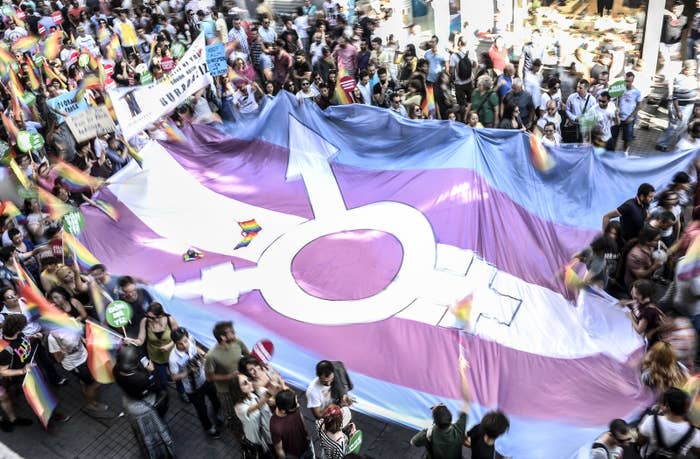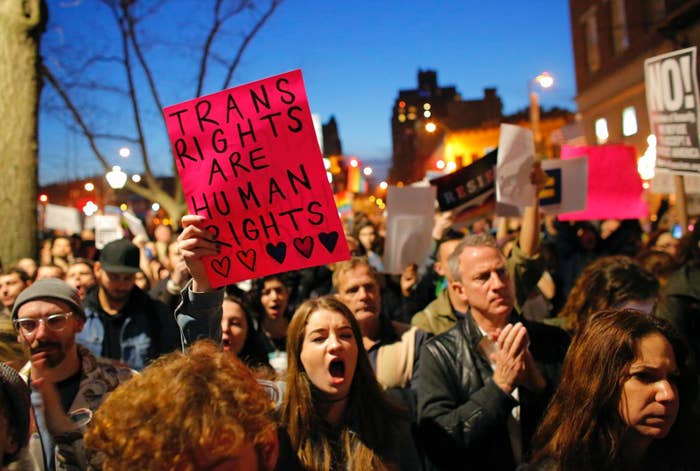
After months of delays, the British government has today launched its formal consultation on how people can legally change their gender. It will last 16 weeks and end on 19 October.
The lead-up to Tuesday's announcement has seen almost a year of furious responses online, in newspapers, and in street protests, and an array of stunts as various anti-trans groups and individuals have attacked what they think will be an assault on women's rights. LGBT organisations are already braced for a further backlash.
But the government has said today it wants to hear everyone's concerns and hasn't come to any conclusions.
The delays to the launch were in part due to the enormous response to the government's LGBT survey, which began last year and was also published today – the results will be informing the consultation.
Information from the Government Equalities Office (GEO) provided exclusively to BuzzFeed News in advance of the launch makes clear that the government is, however, determined overall to make the process by which individuals legally change their gender easier.
Currently, under the Gender Recognition Act 2004, to gain full recognition of one's acquired gender, transgender people have to undertake a range of measures including obtaining consent from their spouse if they are married, providing two pieces of medical consent including a diagnosis of "gender dysphoria" – even though the World Health Organization no longer categorises trans people as having a mental health problem – living as their desired gender for two years, and paying £140.
To obtain such medical letters relies on clinicians' judgments, which trans people often say leaves them and their entire lives at the mercy of doctors' opinions.
"I want to see a process that is more streamlined and de-medicalised," Theresa May, the prime minister, said today. Penny Mordaunt, the minister for women and equalities, added: "In response to our national LGBT survey, trans people have told us that the current system to legally change their gender isn't working and they find the process bureaucratic, costly, and intrusive."

This consultation, added Mordaunt, is therefore an opportunity to "change the system for the better and I look forward to hearing everyone's views".
The document from her department lists the groups of people from whom the government is particularly keen to hear. This includes members of the public who have been through the gender recognition process, other trans and nonbinary people and their partners and families, trans organisations, women's rights groups, religious organisations, medical staff, and businesses that think they will be affected by any changes.
One of the most contentious areas within gender recognition, and therefore in the discussions encircling the consultation, is the extent to which trans women are fully accepted in places such as domestic abuse refuges.
The government states that although the Equality Act 2010 includes nondiscrimination protections for trans people, it also includes caveats enabling, for example, refuges to block access to trans women. The consultation therefore asks all interested parties to express their thoughts on where, or whether, any line should be drawn that enables organisations to discriminate against trans people.
"The government has not yet taken any decisions and responses to the consultation will be considered very carefully," the GEO said today. The department also said that "self-declaration of gender" is "not necessarily" being proposed. This simplified system, which Ireland and others have introduced, is also much contended. In Ireland it is a two-page form that can be processed in a few weeks – as opposed to the years it can take in Britain.

The equalities office also said it is not proposing to lower the current minimum age of 18 at which you can legally change your gender.
One of the other areas of concern among trans people is that individuals need what is known as a "gender recognition certificate" to obtain various forms of help from the state, including a new birth certificate, without which they can be "outed" when applying for other types of ID. Trans people also need the certificate to apply for the state pension at the pension age for women.
The problem for older trans women, some of whom never obtained a certificate because they transitioned in the 1980s or 1990s, is that they therefore could not access their pension until 65, the pension age for men of their generation. Instead, the Home Office fought their attempts to access it, and despite a ruling last week from the European courts, the Home Office has said it will continue to fight them.
The government's own figures from its LGBT survey reveal that the "number of people who have successfully obtained a Gender Recognition Certificate (4,190) ... is far fewer than the estimated size of the trans population in the UK" and thus, "only 12% of the trans survey respondents who had started or completed their transition had used the process". The current gender recognition process, the government concludes, "is not being used".
Campaigners for trans rights have welcomed today's announcement. "Meaningful reforms to the Gender Recognition Act are desperately needed," said Cara English from the charity Gendered Intelligence. "This consultation is all about highlighting the lived experiences and needs of people disenfranchised from the current GRA [Gender Recognition Act] and giving value to their voices."

Two further key areas in the consultation regard nonbinary and intersex people. The first group refers to those who do not identify as either male or female, and the second involves people who have a range of physical intersex variations, which can be hormonal, chromosomal, genital, and reproductive.
The consultation, said the government, "asks an open question about the issue of legal recognition of people who have a non-binary gender identity".
For intersex people the department said it asks a specific question within the consultation, relating to this group, as it recognised the need for an overhaul of the current system as intersex people's sex can be assigned at birth, according to the opinion of the doctor, which later is at odds with the individual's inherent gender identity. The government therefore wishes to understand how policies affect intersex people and will also "publish a separate call for evidence later in the year".
